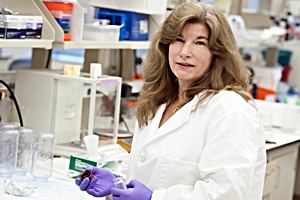8 April 2015. A one year-old company, based on research at a Purdue University biomedical engineering lab, is producing customized biomaterials designed to form into synthetic tissue for drug discovery and toxicity testing. GeniPhys, founded by Purdue biomedical engineering professor Sherry Harbin, aims to further develop the technology, licensed from the university, into engineered tissue for implants and regenerative medicine.
At Purdue, Harbin and colleagues study components and properties of extracellular matrix of human tissues, the materials secreted by cells that make it possible for cells to form into three-dimensional forms and structures. Among those materials is collagen, the main structural protein in animals, consisting of thin filaments called fibrils that assemble into human tissue, such as cartilage and bone.
Harbin’s research examines the processes in the body that generate and assemble collagen, as well as the signaling mechanisms between cells and collagen. Harbin’s research led to a greater understanding of processes that make it possible for collagen to form fibril filaments, the components of collagen that give it shape and structure.
This greater understanding, says Harbin, changed her view of collagen from a static structural element in tissue, to a dynamic participant in the tissue formation process. “[It] is now evident,” says Harbin in a university statement, “that collagen fibril microstructure, mechanical properties including stiffness, and proteolytic degradability [ability to break down proteins into peptides or amino acids] provide critical cues and instructions that control cell fate and tissue formation.”
Based on these findings, Harbin began to see the commercial potential of providing synthetic collagen-fibril tissue designed to meet specific properties and characteristics that offer greater consistency and and quality control. Among those needing this kind of synthetic tissue are pharmaceutical developers where, Harbin says, current lab technologies are limited in their ability to emulate human tissue conditions. She notes that “growth of cells in these over-simplified environments has been shown not to correlate well with human cell responses in the body.”
GeniPhys, located in Zionsville, Indiana produces materials for customized collagen-fibril tissue designed to meet specific formulations needed by drug development labs. “GeniPhys collagen polymers allow scientists to grow cells within a highly reproducible, physiologically relevant 3-D collagen fibril matrix that they can customize,” says Harbin. “In this way, scientists can determine how specific attributes of the collagen [extracellular matrix] affect cell behavior, including tumor metastasis and drug/toxin sensitivity.”
Harbin founded GeniPhys in May 2014, and licensed the technology based on her research from Purdue’s technology transfer office. She then received coaching on starting up and running an enterprise from Purdue Foundry, the university’s business incubator. Unlike some scientific entrepreneurs who leave day-to-day business operations to others, Harbin is a hands-on manager, with her husband Scott Harbin, a partner in the company and practicing veterinarian in McCordsville, Indiana.
GeniPhys plans to develop its technology into production of medical-grade synthetic tissue for implants and tissue engineering, with uses such as wound dressings, organ replacements, and hybrid medical devices. As part of this effort, Harbin is taking a leading role in development of an international standard for collagen polymer formulations to enable more consistent design, development, production, and quality control of collagen-based medical products.
Read more:
- Nanoneedles Deliver Therapeutic DNA, Grow Blood Vessels
- Sensor-Bandage Device Detects Early Forming Bedsores
- Heart-on-Chip Device Built to Screen Drugs
- Biomedical Applications for Nanofibers Sought in Challenge
- 3-D Tissue Assembly System Designed
* * *


 RSS - Posts
RSS - Posts
You must be logged in to post a comment.